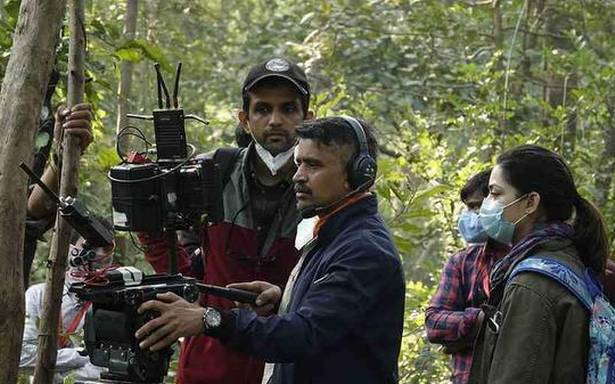The crew tried to be as non-intrusive as possible while shooting ‘Sherni’ in the forests of Balaghat, says cinematographer Rakesh Haridas
The forest is where the plot originates. It is where the action takes place. It is, in fact, the backbone of the story. Yet, the forest in Sherni does not impose. It blends seamlessly into the narrative, setting the context. Shooting Sherni in Balaghat in Madhya Pradesh was a truly liberating experience for its director of photography, Rakesh Haridas. “We wanted to show the jungle as realistically as possible,” he says, over phone from Mumbai.
Rakesh brings the forest alive through a clever manipulation of natural light and shade. “We planned the shots in such a way that we could make full use of daylight. It is easier to get the message of conservation across if you are able to convince people about the beauty of the forest,” he adds.
‘Sherni’ was shot in natural light
Sherni, directed by Amit Masurkar and starring Vidya Balan, on Amazon Prime, is receiving a positive response for its visual artistry and measured treatment of the man-animal conflict. “Amit was clear that he wanted to make the film believable,” says Rakesh, whose relationship with the forest began in his childhood in Munnar in Kerala.
“I was used to seeing elephants raiding the vegetable patch at home and herds of deer and gaur. Growing up in an environment like that, you learn to be sensitive to your surroundings. This background shaped the way I approached Sherni.”
Sensitivity to the forest
Sensitivity to the forest and its people was priority. “We tried to be as non-intrusive as possible and minimised complicated lighting setups.As we had a few people from the region acting in the film, we tried to keep lighting fixtures above their line of vision or worked it into the production design. Even if you observe the indoor shots, we have used LED tube lights, to make non-actors feel at home.”
A scene from the film
Hailed for being devoid of drama, Sherni could easily crossover into the “documentary” genre. “There is no thunderous music or dramatic movements. The ultimate aim of story-telling is to capture life. And today, the line distinguishing fiction from documentary is blurring. Documentary makers are increasingly using the techniques of fiction and vice versa”.
Cinematography, says Rakesh, is about understanding the soul of the story and helping the director tell it. “Cinema is a collaborative process. I am always keen to listen to what the actors or crew feel about the shots. ”
Rakesh was cinematographer for Gulabi Gang, a hard-hitting documentary on activist Sampat Pal Devi and her group in Bundelkhand, Madhya Pradesh, written and directed by Nishtha Jain. Among his notable works are Son Epouse (His Wife), a French film he did in 2013, directed by Michel Spinosa.
Currently preparing for a film to be directed by Tahira Kashyap, Rakesh is working on the post production of a documentary on the jute industry in West Bengal, directed by Nishtha Jain.
Passionate about photography
When he completed his cinematography in FTII, Pune, and moved to Mumbai, Rakesh was sure he did not want to do anything that he was not completely convinced about. He dabbled in advertising, did commercials and travelled thanks to his love of photography. Drawn to photography the age of 15, Rakesh took a lot of pictures. “Those were the days of the film camera and film was expensive. I had to put in a lot of thought into what I clicked. Soon, I learned that I expressed myself best through photography.”
He believes a photograph is full of possibility. “Unlike a film that tells you things, a still photograph is open-ended. The emotion it conveys is your own.”
As a cinematographer, does he believe in the perfect shot? “Yes, I do. It is a rare thing to achieve. Many things have to come together to attain that perfection. The actors’ performance, the movement of the camera, the light… the overall mood. More often than not, it is impossible for filmmakers to wait for that to happen because of time and budgetary constraints. Perfection is a luxury. It happens sometimes and it is magical. You have to be prepared to capture it when it happens.”
Source: Read Full Article


